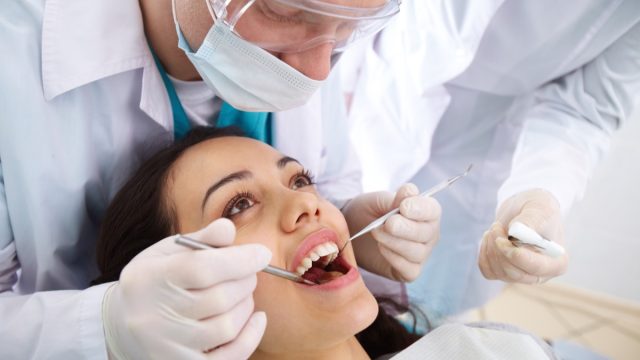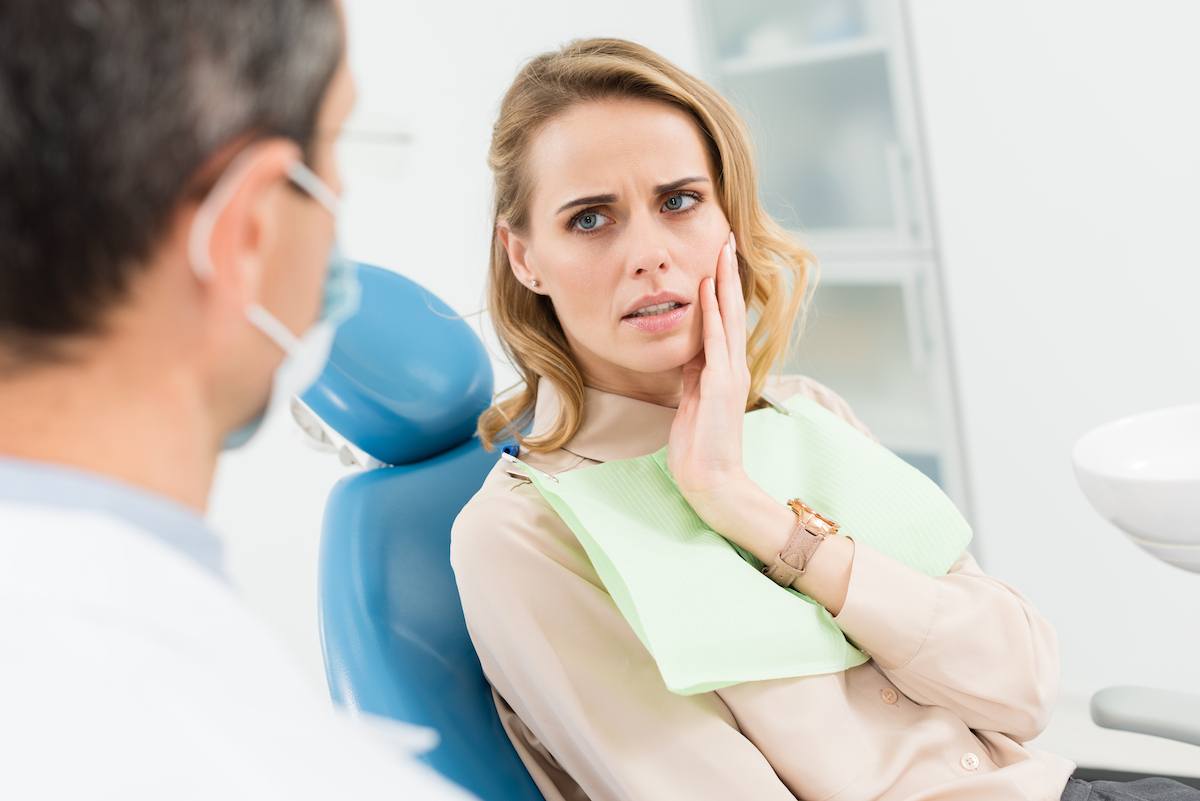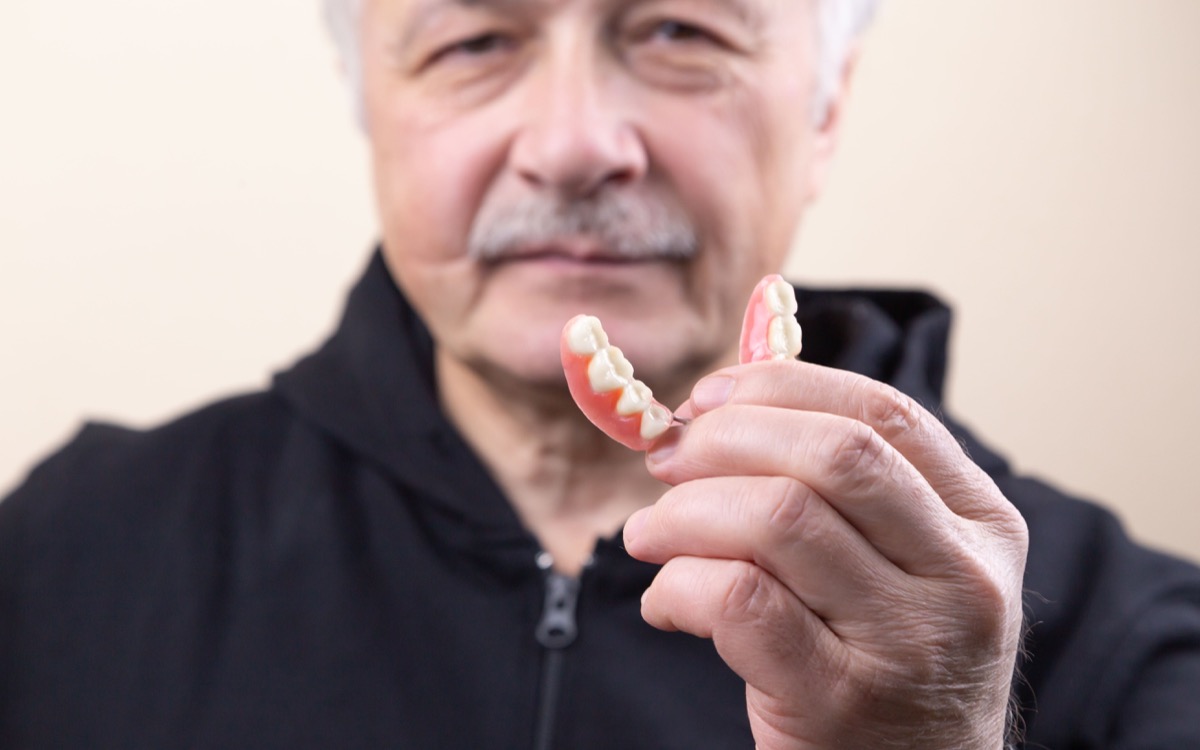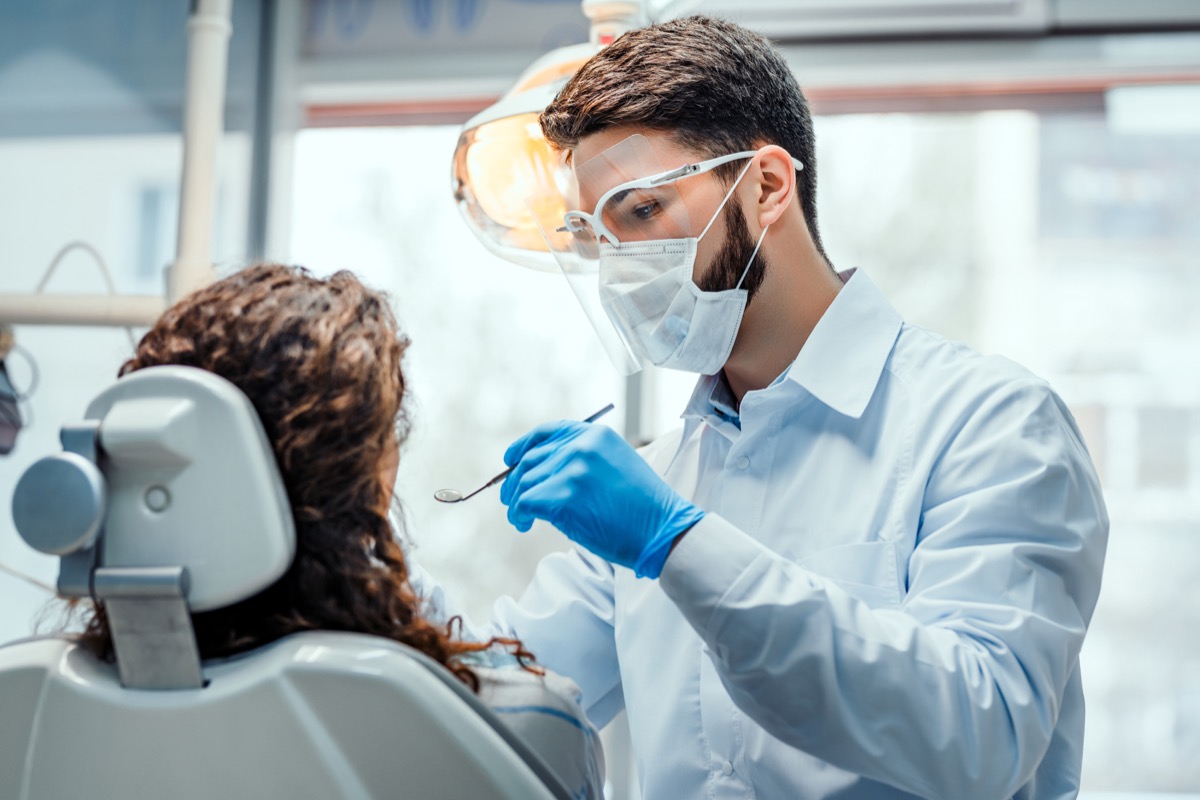What Happens to Your Teeth If You Don’t Visit the Dentist Every Six Months

Essential functions such as eating, drinking, breathing, and speaking all hinge on good oral health. And yet, many people don’t realize that how you care for your teeth has even farther-reaching implications: Poor oral health has been linked to a wide range of health problems including cardiovascular disease, pregnancy complications, cognitive decline, and more.
Besides daily brushing and flossing, visiting your dentist every six months is another key way to ensure your oral health is in tip-top shape. Routine cleanings and exams can help you avoid serious—not to mention expensive—dental health issues, experts say. Read on to learn what happens to your teeth if you don’t visit the dentist every six months, and to find out why skipping your appointment for too long could come with life-threatening consequences.
READ THIS NEXT: Never Do This After Brushing Your Teeth, Dentists Warn.
You may experience tooth decay.

Going to the dentist every six months is an important part of your oral health care—in no small part because it helps prevent tooth decay. “Plaque can be removed by brushing and flossing, but over time, some plaque may develop into tartar, which can only be removed by a dentist or dental hygienist,” says Jennifer Silver, DDS, a dentist with Macleod Trail Dental in Calgary, Canada. “Tartar accumulation can contribute to tooth decay and periodontal disease if left untreated,” she adds. Silver notes that when plaque and tartar accumulate on teeth, bacteria can begin to erode the enamel, resulting in cavities.
Yenile Pinto, DDS, a dentist and the owner of Deering Dental in Miami, Florida points out that the bacteria that leads to tooth decay can spread from one tooth to another, causing widespread dental problems. “This is why it’s so common to have several cavities on the same side and many times the affected teeth will all be next to each other. Keeping your regular visits not only helps remove this bacteria which reduces your odds of having decay in the first place, but it also gives you a chance to spot these problems early on before they spread to more teeth,” she tells Best Life.
READ THIS NEXT: This Common Bathroom Habit Is a “Disaster” for Your Teeth, Dentist Warns.
You may be more likely to experience tooth loss.

If you don’t visit the dentist every six months, you may also be at higher risk of gum disease, or periodontitis, Silver warns. Known to damage the soft tissue around teeth, gum disease can ultimately erode the bones supporting the teeth “which can result in tooth loss and other health issues if left untreated,” she says.
Think it can’t happen to you? Tooth loss is a surprisingly prevalent problem across the U.S., according to the Centers for Disease Control and Prevention (CDC). Over one-quarter of adults over the age of 65 have eight or fewer teeth, while one-sixth of adults in that age range have lost all of their teeth.
You may develop bad breath.

When you go too long between dental visits, you run the risk of developing halitosis—the main symptom of which is bad breath. “Without correct and regular brushing and flossing, and routine dental exams, food remains in the mouth,” explain experts from Johns Hopkins Medicine. “This is a breeding ground for bacteria. Food that collects on the teeth, gums, and tongue may rot. This causes an unpleasant odor and taste in the mouth.”
If you experience ongoing bad breath, it’s important for you to see your dentist in order to help rule out any possible underlying conditions. These can include kidney disease, diabetes, tonsillitis, certain respiratory infections, gastrointestinal problems, and more.
For more health news sent directly to your inbox, sign up for our daily newsletter.
Your teeth may become more discolored.

When you skip dental appointments, you skip the deep cleanings that help prevent tooth discoloration. “Certain foods, beverages, and behaviors (such as smoking) can discolor teeth over time. Regular cleanings and examinations can aid in preventing or minimizing these blemishes,” says Silver.
Establishing good dental health habits at home can also help prevent tooth discoloration. Brushing twice a day with a dentist-approved whitening toothpaste and flossing daily are a great place to start. Additionally, you should limit your intake of foods and beverages that are known to stain teeth, such as coffee, soda, tea, juice, and red wine. Quitting smoking can also help prevent tobacco stains on your teeth—not to mention reduce your risk of oral cancer.
You’ll fall behind on screening for oral cancer.

One of the most important things your dentist does during a checkup is something you may not even notice: screening for signs of oral cancer. “Most people aren’t aware of this, but a standard part of your dental exam is an oral cancer screening,” explains Pinto, who says that the process involves carefully examining the gums and soft tissue of the mouth to identify any suspicious spots or lesions.
“I’ve had several patients come in that presented discoloration and abnormalities that concerned me and prescribed a biopsy in order to rule out cancer,” she says, adding that early detection is key, and that skipping your appointment could have a “significantly negative impact on your health.”
To this point, if you notice any symptoms of oral cancer between appointments, don’t wait until your next checkup to have them examined, experts warn. Some symptoms of oral cancer include “a lip or mouth sore that doesn’t heal, a white or reddish patch on the inside of your mouth, loose teeth, a growth or lump inside your mouth, mouth pain, ear pain, and difficulty or pain while swallowing, opening your mouth or chewing,” explains the Mayo Clinic. Speak with your doctor or dentist to learn more about screening for oral cancer.
Best Life offers the most up-to-date information from top experts, new research, and health agencies, but our content is not meant to be a substitute for professional guidance. When it comes to the medication you’re taking or any other health questions you have, always consult your healthcare provider directly.